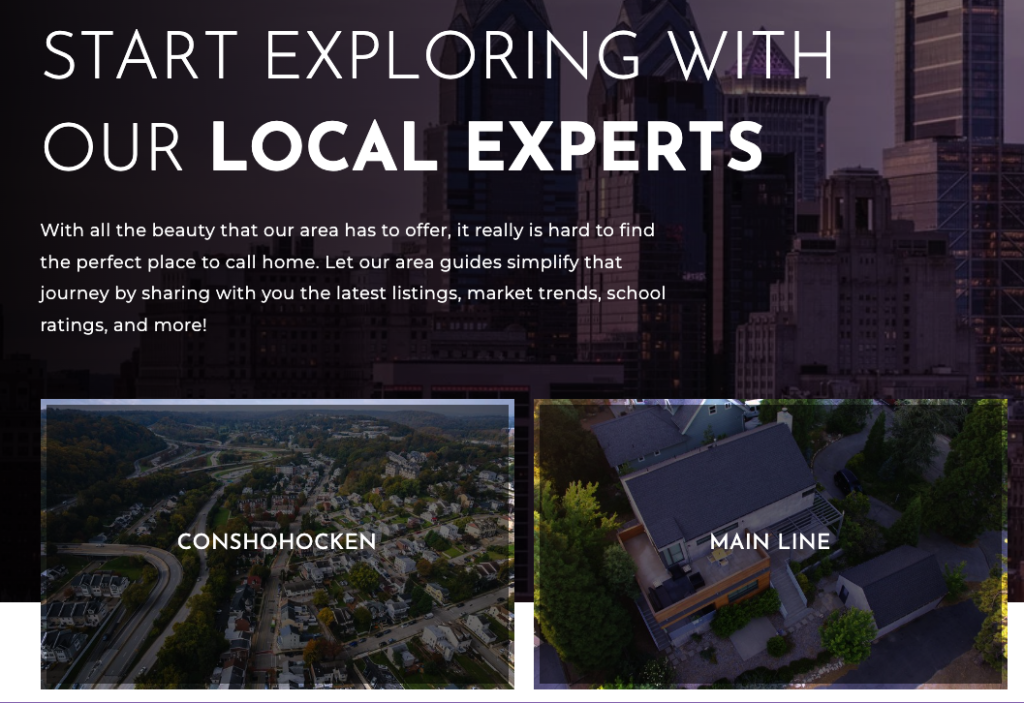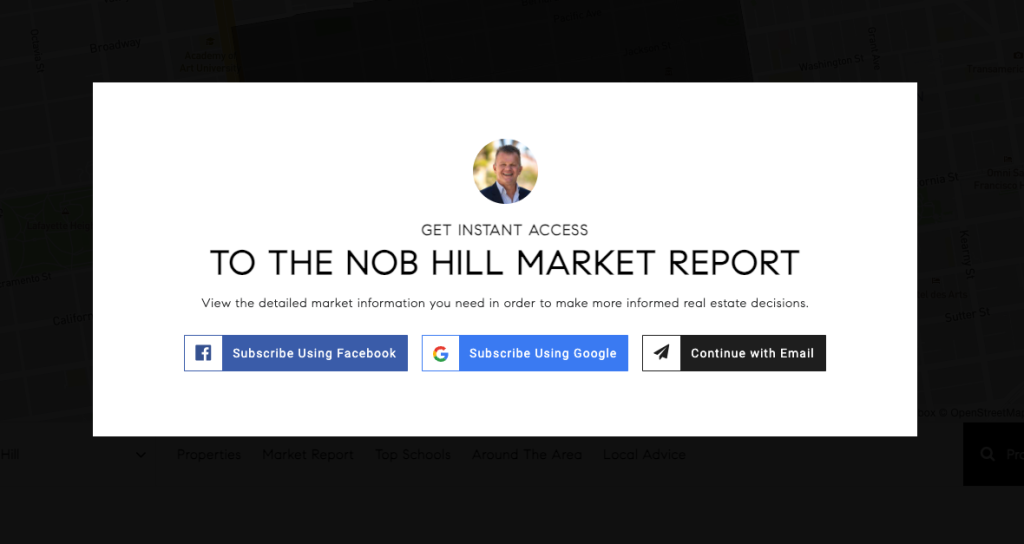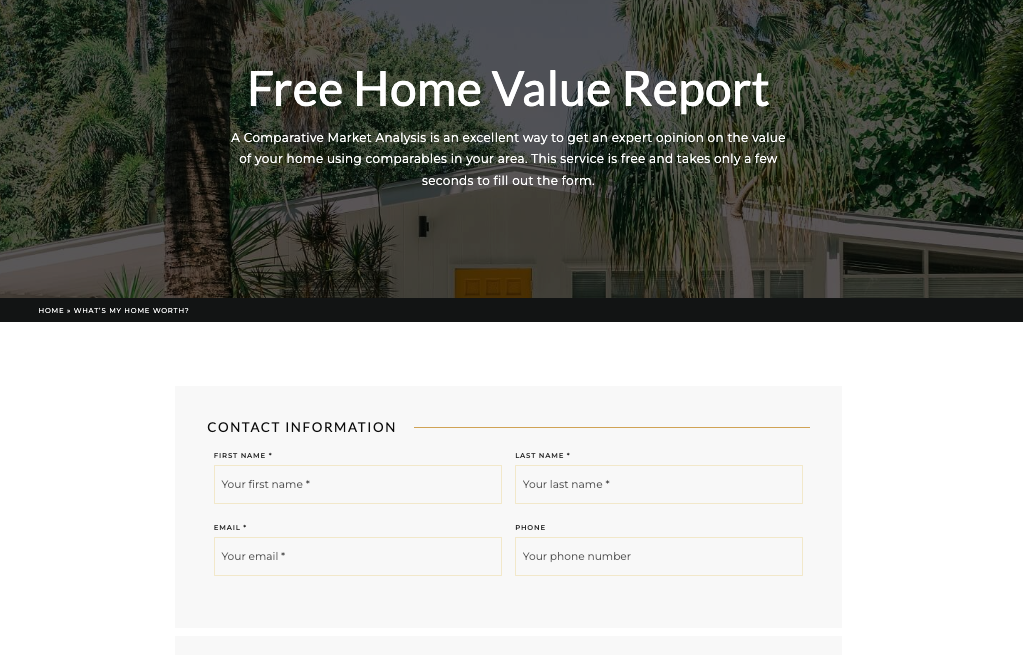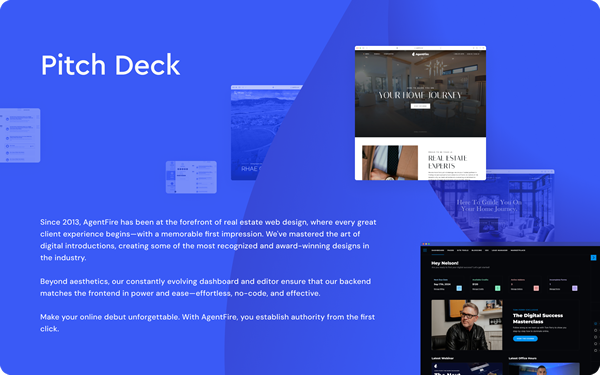Are you realizing email marketing for real estate to its full potential? Whether you're optimizing your existing strategy or just getting started, read our comprehensive so you can get more leads turn them into clients faster than ever.
Email Marketing
Are you utilizing email marketing for your real estate business to its full potential? You’d better be. In the constantly evolving and highly competitive landscape of real estate marketing, email remains one of the most effective – if not the most effective – marketing channel. It offers a direct line of communication with both prospective and past clients, and makes it easy for you to send high quality, personalized messages to anyone in your contact list.

Remember: email marketing for real estate is not just about sending property listings or open house invitations; it’s about creating curated content that resonates with your audience, nurturing relationships, and establishing yourself as a trusted advisor in their home buying or selling journey.
By learning about lead generation tactics, email marketing platforms, automation, personalization, A/B testing, and email key email marketing metrics, you can launch or improve your existing real estate email marketing strategy, starting today.
If you’re not a real estate email marketing expert yet, you will be by the end of this post, so read on!
Lead Generation Strategy: A Must-Have for Real Estate Agents
In the cutthroat world of real estate, having a killer lead generation strategy is non-negotiable. Nurturing potential customers until they’re ready to take the plunge is a crucial part of success in real estate, so you need to have an action plan so that you always have a steady stream of viable leads.
Identify Your Target Audience
Begin by thinking about who your intended audience is. Are you after first-time homebuyers? Or maybe your niche is luxury properties or investment opportunities? Once you’ve identified your ideal client, make sure your site appeals to this specific audience, and create content that will entice them enough to share their contact information with you.
Create Compelling Content on Your Site
In addition to the actual content on your site – photos, relevant neighborhood information, etc. – you should be creating in-depth content that shows off your real estate expertise. Think home buying guides specific to your geography or glowing customer testimonials.

Virtual tours are also a great way to engage potential leads on your site. The longer someone stays on your page, the more likely they are to feel comfortable passing along their information.
Examples of Tailored Content
- Luxury Real Estate: Showcase stunning visuals of lavish properties along with descriptions detailing unique architectural elements or exclusive community perks. Mansion Global is a great source for luxury real estate news and trends.

- Affordable Housing: Highlight how certain neighborhoods offer great value while still still providing access to quality schools and amenities. Check out HUD’s website for information on affordable housing programs in your area.
Add CTAs on Valuable Pages
Every page on your site should have a CTA for lead capture, and you should ideally have relevant, timed pop-ups that engage visitors after they’ve spent a specific amount of time on your site or when they attempt to leave the page.


If you have high-value content, like in-depth home buyer guides or interactive tools, you can ask for visitors to provide their contact information before they can view it.
All of the CTA examples above are from AgentFire customer sites. Learn about all the marketing tools that come with AgentFire that will make it easier than ever for you to generate high-quality leads.
With AgentFire, we have a website that looks amazing, functions and is extremely FAST! It has already generated leads, and we get compliments almost daily. Read Full review
Choosing the Right Email Marketing Platform for Your Business
Choosing the right software for your real estate email marketing is a crucial step in ensuring your agency is set up for success. Ideally, you want to get this right the first time to avoid wasting effort in the future transitioning to another system.

There are tons of great options out there, and since many of them include week or month-long free trials, you should try a few before fully committing. Below is a short list of some of the services we’ve seen AgentFire customers have success with.
MailChimp

MailChimp is one of the most popular options out there. That being said, it isn’t specifically tailored to the real estate market and can get pricey as your contact list grows.
Pros:
- Free Tier: Mailchimp offers a free plan that can be useful for small businesses or startups with a limited budget. It allows you to have up to 2,000 contacts and send up to 10,000 emails per month, which is quite generous compared to some other platforms.
- A/B Testing: Mailchimp provides robust A/B testing features, allowing users to optimize their email campaigns based on actual data.
- Integrations: Mailchimp offers integration with many other platforms and services, which can streamline your workflow.
Cons:
- Pricing: While Mailchimp does offer a free plan, its pricing can be relatively high once you need to upgrade. The cost increases as you add more contacts, and some essential features are only available in higher-tier plans.
- Customer Support: Customer support is not available in the free plan. Even in paid plans, it might take some time to get a response.
- Complexity: While Mailchimp is generally user-friendly, its wide range of features and options can be overwhelming for beginners.
Constant Contact

Constant Contact is another well-known choice among real estate agents. It provides extensive template choices but lacks advanced segmentation options compared to other platforms.
Pros:
- Template Variety: The platform provides a wide range of professionally designed email templates, making it easier for users to create visually appealing emails.
- Event Management: Constant Contact offers event management tools, which are not commonly found in other platforms. These tools can be particularly useful for agencies that host events regularly.
- Customer Support: Constant Contact offers excellent customer support, with various resources like live chat, phone support, community forums, and a vast library of tutorials and articles.
Cons:
- Pricing: Compared to some other email marketing platforms, Constant Contact can be more expensive, particularly for businesses with a large number of contacts.
- Limited A/B Testing: Constant Contact’s A/B testing is limited to subject lines only, so you won’t be able to test the actual content of your emails.
- No Free Plan: Unlike some competitors, Constant Contact does not offer a permanently free plan, although they do offer a free trial.
ActiveCampaign
ActiveCampaign is a powerful email marketing platform that makes it easy to build automated workflows and test campaigns.
Pros:
- Advanced Automation: ActiveCampaign is known for its robust automation capabilities, which can save time and deliver personalized experiences to your audience.
- Segmentation: The platform provides advanced segmentation capabilities so you can target your audience in a highly personalized way based on their behaviors and interests.
- Multichannel Marketing: ActiveCampaign supports email marketing, SMS, social media, and even direct mail, enabling you to reach your audience through multiple channels.
Cons:
- Learning Curve: While powerful, ActiveCampaign’s extensive features and advanced automation can be complex to learn, particularly for beginners.
- Cost: Compared to other email marketing platforms, ActiveCampaign can be more expensive, especially for businesses with a large number of contacts.
- Email Template Design: Some users have reported that ActiveCampaign’s email templates and design editor are less user-friendly compared to other platforms.
Key Takeaway: No single email marketing platform is capable of providing the perfect solution for every real estate agent’s needs. Your decision should hinge on what aligns with your goals and budget, as well as what will be the easiest for you and your team to use.
With Active Campaign, you can easily integrate your real estate site with your chosen email marketing platform. Learn about all our integrations.
Efficiency is Key: Leverage Automation in Your Real Estate Email Marketing
As a real estate agent, time is your most valuable resource. To make the most of it, you need to automate as many processes as possible, including your email marketing efforts.

All of the options above include some form of automation built in, so be sure to maximize whatever platform you choose and start automating from day one.
Set Up Drip Campaigns
Drip campaigns are a series of automated emails sent out at specific intervals or based on certain triggers, like a new sign-up or property inquiry. They’re perfect for nurturing leads and keeping your brand top-of-mind with potential clients. All you have to do is set up the campaign once, and your leads will get a steady stream of valuable information from you, helping them inch closer to the home-buying or selling process..
Schedule Newsletters
A well-crafted newsletter can be an effective tool for sharing market updates, upcoming open houses, and other relevant information with leads. If someone is at the “interested” stage of home-buying but isn’t ready to fully commit, a market newsletter with available homes, recent sales, and other neighborhood updates can be a valuable way to stay top of mind with future clients.
Create Automated Follow-ups
If you’re responsive with potential clients, they’ll know that you’re a real estate agent they can depend on. Automating follow-up emails ensures that every inquiry receives a prompt reply, even when you’re busy closing deals, hosting an open house, or dealing with the dozens of other things you have to manage as a real estate agent.
Key Takeaway: By leveraging automation in your email marketing efforts, you can save valuable time and ensure that no lead falls through the cracks. This allows you to focus on what truly matters – building relationships with clients and closing deals. Remember: work smarter, not harder!
Personalize Your Messages for Maximum Impact
Home buyers want to connect with a person, not a generic real estate business, and this means more than just including their name in emails.
You need to send messages that directly speak to their needs, preferences, and potential concerns about buying or selling a home.
To start personalizing, segment your email list based on factors like location, property type interest, or buyer status, then tailor your content accordingly.
Always include personalized subject lines and body copy when possible (which can be done with automation), and focus on their specific interests or pain points related to real estate.
👪 Families? Offer guides on neighborhood amenities or schools.
👨💼 Real estate investor? Highlight exclusive listings or market trends.
🏷️ Sellers? Provide tips on staging homes for quick sales.
Key Takeaway: Personalized emails significantly enhance client relationships by showing them you understand their unique needs – leading to more closed deals. All of the platforms mentioned above come with features that allow you to insert dynamic content based on customer segmentation, so start personalizing from day one!
Optimizing Your Real Estate Email Marketing with A/B Testing
A quick way to see what will work with your audience is by creating two email campaigns with slight modifications to the subject line or email body content. This takes very little effort but can have a huge impact in helping you understand what appeals the most to your target audience.

How A/B Testing Works
The key to A/B testing is altering only one component at once in order to determine which factor affected the result. This way, you can easily identify which factor influenced the outcome. You can test different elements such as:
✍️ Email subject line: Try using different wording or tones in each variant. For example, one version could use a question while the other uses a statement.
📝 Email content: Experiment with different text formatting, such as bolding certain phrases or adjusting paragraph lengths. You can also try different types of content, such as videos versus images.
💥 Calls-to-action (CTAs): Vary CTA placement within your emails or use different action words like “see this property” versus “schedule an open house.”
Key Takeaway: By analyzing which version generates better results – whether it’s higher open rates, click-throughs, or conversions – you can gain valuable insights into what resonates most with your audience. If you’re new to real estate email marketing, this is a great way to quickly learn a lot about what resonates with your potential buyers or sellers.
Track Your Email Marketing Results for Better Performance
Sending your emails and hoping for the best is a one-way ticket to failure. You can’t improve what you don’t measure, so always track your email marketing campaigns so that you can continuously improve your efforts.

If you’re an email marketing newbie, don’t worry, we’ll explain the most important metrics you should be monitoring.
Open Rates
How many people are opening your emails? If this number is low, you’re doing something wrong. Your email subject lines might be uninspired, or you could be sending too many – or even too few – emails. Make some adjustments, and don’t be afraid to get creative so that people see something eye-catching in their inbox. For reference, the average email open rate in the real estate industry is 26%.
Click-Through Rates (CTR)
CTR measures how many people clicked on links within your email. A low CTR could indicate a problem with the content of the email itself or with its layout and design. Keep your emails short and sweet, and get to the good stuff – don’t expect people to click through to a listing if they have to read a rambling wall of text first. Above all, make sure any links are relevant and easy to find. A good goal for click-through rates is anything above 5%.
Bounce Rates
Bounce rate refers to the percentage of sent emails that couldn’t be delivered successfully due to various reasons like incorrect addresses or full mailboxes. If you’re seeing a lot of emails bounce, it’s time to clean your email list – emails that can’t be delivered are worthless to your business, so get rid of any incorrect or spammy contacts you have.
Unsubscribe Rates
While getting a notification that someone unsubscribed from your list can be a downer, the reality is that people will unsubscribe for a variety of reasons, both good and bad. A good reason would be that they’re no longer in the market to buy a house. A bad reason would be that the content you’re sending them isn’t relevant or is just plain boring.
Key Takeaway: Email marketing is not a set it and forget it endeavor – while you should be automating as much of your real estate email marketing as possible, you need to regularly make changes based on campaign performance if you want to see the best results.
FAQs in Relation to Email Marketing for Real Estate

Is Email Marketing Effective in Real Estate?
Yes. Email marketing isn’t just effective; it’s a necessary tool for any successful real estate agent. WIth email, you’ll be able to send targeted content to potential customers and move them along in the buying or selling process.
How Do You Create an Email Marketing Campaign in Real Estate?
First, identify your target audience and create a compelling subject line and email content that speaks to their needs and interests. Then, use whatever email marketing platform you’ve chosen to send targeted content, run A/B tests, and measure results. Rinse and repeat to see your business grow!
How Do I Grow My Real Estate Email List?
Offer valuable content, such as exclusive listings or market reports, in exchange for email sign-ups on your website and social media channels. Another old-school but tried-and-true tactic is to host events and collect email addresses in person.
What Other Forms of Digital Marketing Can Real Estate Agents Use?
Social media marketing and search engine optimization (SEO) are effective ways to reach potential clients online. Consider creating a strong social media presence to show off your unique brand and optimizing your website so that you pop up first for relevant searches.
Conclusion
Email marketing for real estate is a powerful tool to help you close more deals, earn more commissions, and grow your business – here’s how to make it work:
- Decide how you’ll generate leads
- Choose the right email marketing platform for your business
- Leverage automation for maximum efficiency
- Run A/B tests to learn what resonates with your customers
- Track your campaigns and improve what isn’t working
Click the button below to learn more about pricing.




